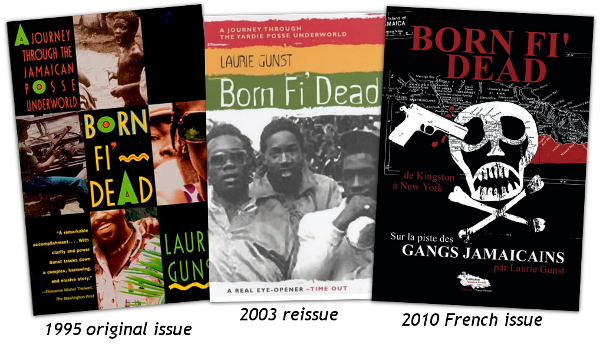Articles about reggae music, reviews, interviews, reports and more...
Interview: Born Fi' Dead, At The Heart of Jamaican Gangs
- Home
- Articles
- Interviews
- Interview: Born Fi' Dead, At The Heart of Jamaican Gangs

Interview: Born Fi' Dead, At The Heart of Jamaican Gangs
"I understood that the message of peace and love was deeply rooted into the close political environment of the artists"
Gangs, drugs and politicians. This explosive mix has been all-powerful on the island of Bob Marley for nearly fifty years. Editor-in-chief of the French reggae magazine Natty Dread and author of a history of ancient Jamaica, Thibault Ehrengardt translated Laurie Gunst’s famous book, Born Fi’ Dead in french. An investigation into Jamaican gangs. Thibault talks about a sinister country.

Born Fi’ Dead appeared in 1995. Why wait so long to translate it?
Thibault Ehrengardt : When I read it I was young! (N.B. Thibault Ehrengardt is 35 years old). This book changed my view of reggae and of Jamaica. I understood that the message of peace and love was deeply rooted into the close political environment of the artists. Born Fi’ Dead (literally “Born To Die”) allowed me to understand the political dimension of reggae music. We recently launched the Jamaica Insula series dedicated to publish what we consider to be good books about Jamaica - Born Fi Dead definitely falls into that category.
Is this still happening now?
This book traces the genesis of gangs and the establishment of the political mafia system that continues to undermine the country. It all started in the 1960s and 1970s. Notably with the construction of the Tivoli Gardens ghetto by the head of the Jamaica Labour Party, Edward Seaga. It was the stronghold of the most powerful gang in Jamaica, the Tivoli Gardens Posse (or Shower Posse to Americans). Still today Born Fi’ Dead is pretty much censored on the island, it’s very hard to get a copy. At least it allows outsiders to have a better understanding of Jamaican society.
Has Jamaica changed in the last 20 years?
It is part of the third world, stricken, undermined by its lack of resources. The island is vulnerable to external forces: Columbia or Mexico for drugs and the USA to flog goods or dreams of a better life. Nothing has really changed. Wars in the neighbourhoods carry on. Politicians and gang leaders still give backhanders to their buddies.
Jim Brown says that Christopher “Dudus” Coke, godfather of drugs and son of the famous Lester Coke, has been arrested. Why did the residents of the ghetto fight to stop his extradition to the United States?
They did not all support him, far from it! Remember that the residents of Tivoli Gardens live under the yoke of the mafia; they’re at the mercy of all-powerful gangs! Life is hard, dangerous. People are worried; they are frightened of the lawlessness. Despite the backhanders, they are financially bereft. The mafia manages the neighbourhood’s economy, sends the kids to school and distributes jobs on the behalf of such and such a politician. Who in turn is guaranteed a seat for life in Parliament as voters will vote according to instruction.
The current Prime Minister, Bruce Golding, has promised a grand offensive against crime and against complicity between political parties and gangs. Wishful thinking?
Every government talks about it… It didn’t stop him from protecting “Dudus” for as long as he could! I wonder more why the Americans wanted him at all costs and why now.
And how is the Jamaican gang situation remarkable?
They’re institutionalised! Politics have pretty much created them, maintained them. In the 1960s and at the time of the elections in 1980, there were waves of suspicious deaths of gangsters. Political classes have always been suspected. Even “Dudus”’ father died in mysterious circumstances: burned alive in his cell.
Who controls Jamaica?
No-one and everyone! The IMF, the CIA, the politicians but also the gangs… gangs whose leaders often fall! Jamaica is part of the United States sphere of influence who, as we know, never hesitates to defend it own interests by any means… In fact, all democracies are hypocritical: they defend their great principles – law, equality, justice… - which they flout without any inhibition when it suits them. Jamaica remains a democracy, even if it’s a narco-democracy.
Translated from French by Veronique Skelsey
Read more about this topic
Read comments (2)
| Posted by MadMax on 07.18.2010 | |
| Hey give thanks to the author of this book... I will find a way to get my hands on in.. It annoys me what kind of country am I living in this is no democracy just because the book outs Edward CIA Seaga I cant get the book legally in Jamaica SMH. | |
| Posted by DREAD Editions on 10.16.2013 | |
| Yes MadMax, a shame. Internet makes things easier though, just have a look at our latest book: www.gangs-of-jamaica.com (available in English as a E-book, to be downloaded from anywhere and to be read on any device). | |
Comments actually desactivated due to too much spams
Browse by categories
Recommended Articles
Latest articles
Recently addedView all
© 2007-2026 United Reggae. All Rights Reserved. Reproduction in whole or in part is prohibited. Read about copyright
Terms of use | About us | Contact us | Authors | Newsletter | A-Z















